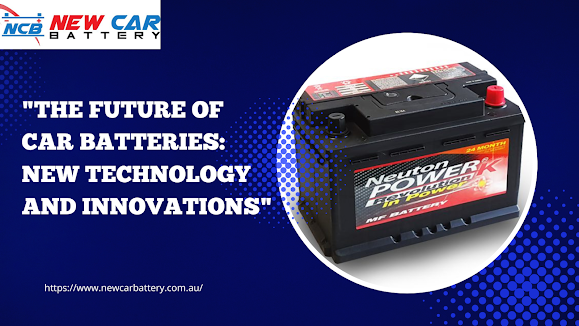"The Future of Car Batteries: New Technology and Innovations"
The future
of car batteries is set to be defined by new technology and innovations.
The demand for more efficient, sustainable and affordable electric vehicles
(EVs) is growing, and the car battery is one of the key components that will
determine their success. In the following paragraphs, we’ll examine some of the
latest advancements in new car battery technology and what they mean for
the future of EVs.
Solid-State Batteries: This new technology promises to revolutionize the car
battery industry by offering higher energy density, faster charging times, and
better safety. Solid-state batteries use solid electrodes and electrolytes,
which eliminate the risk of leakage and combustion associated with traditional
liquid-based batteries. They are also lighter, smaller, and offer longer
driving ranges than current lithium-ion batteries.
Recycling and Second-Life Batteries: With more and more EVs on the road,
the demand for recycled and second-life batteries is also growing. These
batteries can be repurposed for use in other applications such as energy
storage systems, thereby extending their life and reducing waste.
Improved Charging Infrastructure: As the number of EVs continues to
grow, the need for convenient and efficient charging infrastructure is becoming
more critical. Companies and governments are investing in fast-charging networks
and developing smart charging solutions to make the charging process smoother
and more accessible for EV owners.
Wireless Charging: Another innovation that is gaining traction is wireless
charging. This technology allows EVs to charge simply by parking over a
charging pad, eliminating the need for cables and chargers. Wireless charging
is also more convenient and reduces the risk of damage to the battery caused by
incorrect charging.
Integrating Renewable Energy Sources: To further reduce the carbon footprint
of EVs, battery manufacturers are looking at ways to integrate renewable energy
sources into their charging process. This includes using solar panels, wind
turbines, and other sources of renewable energy to charge EVs directly or store
energy for later use.
In conclusion, the future
of car batteries is set to be defined by new technology and innovations that
will make EVs more efficient, sustainable, and affordable. From solid-state
batteries to improved charging infrastructure, these advancements are set to
shape the future of the electric vehicle industry.
Lithium-ion advancements and breakthroughs
New Cathode Materials:
Development of high energy density cathode materials, such as
Lithium-Nickel-Manganese-Cobalt Oxide (NMC) and Lithium-Iron-Phosphate (LFP),
have significantly improved the energy density of Li-ion batteries.
Solid-State Batteries: The
development of solid-state Li-ion batteries, which replace the liquid
electrolyte with a solid material, has improved safety, stability and increased
energy density.
Recycling and Reuse: Advances
in recycling and reuse technology have made it possible to recover valuable
metals from end-of-life batteries and reduce the environmental impact of
battery production.
Fast Charging: Development of new fast
charging methods has made it possible to charge Li-ion batteries in a matter of
minutes, instead of hours.
Improved Safety Features: The
implementation of new safety features, such as thermal protection systems and
fire-retardant materials, have significantly reduced the risk of thermal
runaway and fire in Li-ion batteries.
Increased Lifespan:
Improvements in manufacturing processes and new electrolytes have increased the
lifespan of Li-ion batteries, making them more durable and long-lasting.

.png)

.png)
Comments
Post a Comment